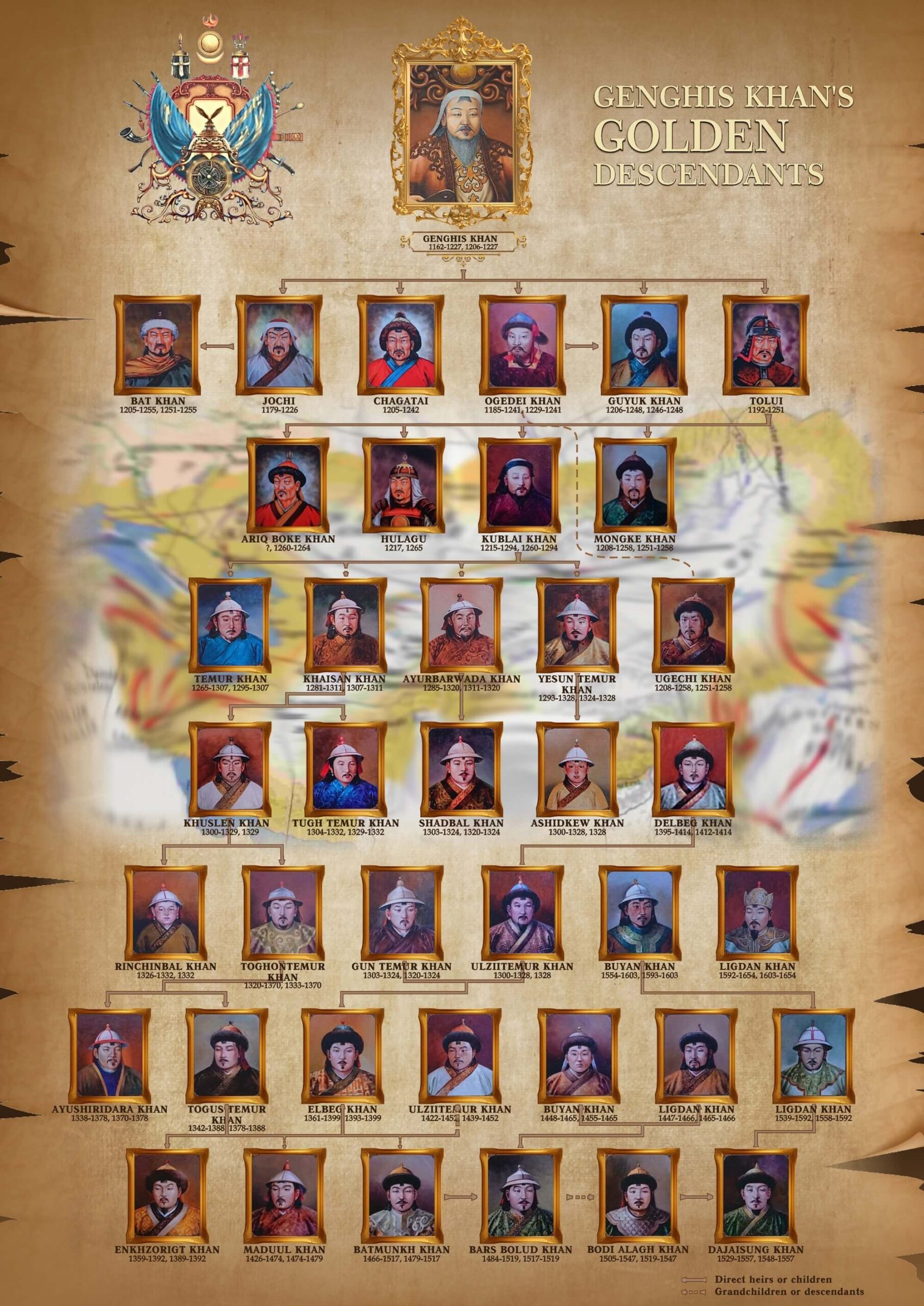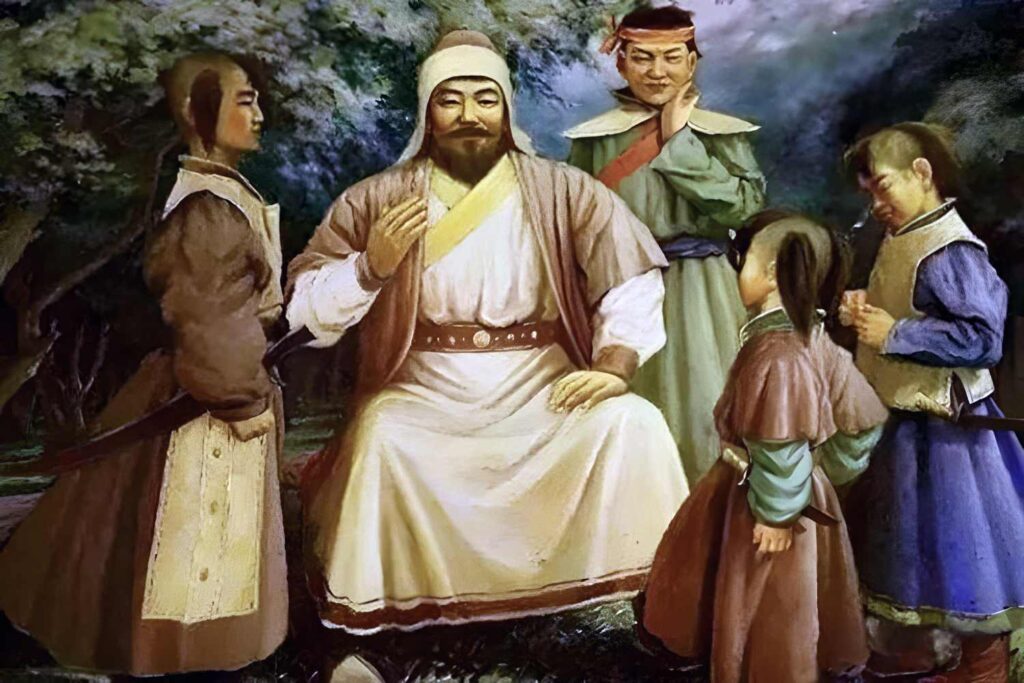Genghis Khan's Children: How Many & Why?
How many children did Genghis Khan, the formidable Mongol leader, actually father? The historical consensus, though shrouded in the mists of time and legend, points towards a staggering number, with estimates ranging from a thousand to two thousand children, a legacy that has indelibly shaped the genetic map of the world.
The sheer scale of Genghis Khan's progeny is almost unfathomable. His impact extends far beyond the battlefield, into the very fabric of human ancestry. It's estimated that as many as 20 million men alive today can trace their lineage directly back to the Mongol emperor, representing roughly 0.5% of all men on the planet. This remarkable statistic alone underscores the profound influence of Genghis Khan and his descendants.
| Full Name | Temjin (Later Genghis Khan) |
| Born | Around 1162 in Deln Boldog, near the Onon River, Mongolia |
| Died | August 18, 1227, in Yinchuan, Western Xia, China |
| Known For | Founder and Great Khan of the Mongol Empire, one of the largest contiguous empires in history. |
| Notable Achievements | Uniting the Mongol tribes, military strategist, establishing the Mongol Empire, implementing the Yassa (Mongol law code). |
| Marriages | Reportedly had over 40 wives and numerous concubines, including Brte, his primary wife. |
| Children | Estimated to have fathered between 1,000 and 2,000 children. Four primary sons are particularly well-known: Jochi, Chagatai, gedei, and Tolui. |
| Legacy | Founder of the Mongol Empire, vast territorial expansion, establishment of Mongol law and administration, his descendants ruled over a vast empire for centuries, influencing a large part of Asia. |
| Reference | Britannica - Genghis Khan |
The quest to quantify Genghis Khan's children is a complex one, intertwined with the nuances of historical record-keeping, the prevalence of polygamy in Mongol society, and the sheer vastness of the empire he forged. While the exact number remains elusive, the evidence strongly suggests a remarkably prolific father.
The Mongol Empire, at its zenith, stretched from Eastern Europe to the Sea of Japan, a testament to Genghis Khans military genius and strategic vision. His conquests brought him into contact with numerous cultures and peoples, and the custom of taking wives and concubines from conquered territories was widespread. This practice, coupled with a large harem, undoubtedly contributed to the large number of children attributed to him.
Historical accounts suggest that Genghis Khan had a large harem, comprising numerous wives and concubines. These women, often taken from conquered tribes and nations, bore him a multitude of children. While the exact number of wives is debated, estimates range from forty to hundreds. Some historians suggest that Genghis Khan had over 500 wives.
Brte, Genghis Khan's primary wife, held a position of great importance. She bore him his four primary sons: Jochi, Chagatai, gedei, and Tolui. These sons played crucial roles in the Mongol Empire's administration and expansion, ensuring the continuation of Genghis Khan's legacy.
- Tom Hardy Charlotte Riley The Untold Love Story Google Discover
- Fake Story The Tim Walz Horse Semen Rumor Explained Factcheck
The youngest of Genghis Khan's primary sons, Tolui, born around 1191, was rumored to be fiercely loyal to his father and actively participated in numerous military campaigns. His courage and dedication to the Mongol cause made him a valuable asset to the empire.
The question of whether all of Genghis Khan's children came from the same wife is easily answered. Due to his lifestyle, including the large number of wives and concubines, Genghis Khan fathered children with many women, not just Brte.
The ability of Genghis Khan to father so many children stems from a confluence of factors. He was the leader of a vast empire, which provided him with the resources and power to maintain a large harem. The Mongol practice of polygamy, combined with the taking of women from conquered territories, created an environment conducive to the production of many offspring.
The "super father" was not only a formidable warrior but also a man who left an indelible mark on the genetic landscape of the world. His legacy continues to resonate through the generations, with his descendants scattered across Asia and beyond.
The influence of Genghis Khan extends far beyond his military achievements. His empire's vastness, lasting for centuries, facilitated cultural exchange and the dissemination of Mongol customs and traditions. This, in turn, helped to establish a lineage that has survived until today.
Genetic studies have played a critical role in confirming the extent of Genghis Khan's legacy. Research has identified a particular Y-chromosome lineage prevalent in a large segment of the male population across Central Asia. This lineage is believed to be linked to Genghis Khan and his male descendants, providing tangible evidence of his genetic impact.
The formal recognition of children varied. While he had at least four official sons and five daughters with Brte, the primary wife, many children born of concubines might not have been formally acknowledged, which makes calculating the total number of children challenging.
The lack of comprehensive records and the complexities of Mongol society contribute to the continuing uncertainty about the exact number of his children. Despite this, the pervasive genetic evidence and historical accounts strongly support the belief that Genghis Khan fathered a remarkable number of offspring.
While the exact number of children remains subject to debate, the impact of Genghis Khan on the genetic makeup of humanity is undeniable. His numerous offspring, the product of a life of conquest and a culture that valued polygamy, have created a legacy that continues to thrive.
| Key Aspects | Details |
| Number of Children | Estimated between 1,000 and 2,000 |
| Genetic Legacy | Ancestry of approximately 20 million men today, or about 0.5% of the world's male population. |
| How it Happened | Large harem, multiple wives, and a culture that permitted polygamy. |
| Primary Wife | Brte |
| Primary Sons | Jochi, Chagatai, gedei, and Tolui |
| Impact of Empire | Facilitated cultural exchanges and disseminated Mongol customs. |
| Modern Evidence | Genetic studies identifying a common Y-chromosome lineage across Central Asia, likely linked to Genghis Khan. |
| Historical Context | Mongol Empire's vast territory, military conquests, and the practice of taking wives from conquered territories. |
In essence, the story of Genghis Khan's children is a testament to both his personal life and the dynamics of the Mongol Empire. His legacy isn't solely defined by his military victories, but also by the vast network of descendants he left behind. While historians continue to debate the precise numbers, the undeniable impact of his procreative prowess is a fundamental part of his story.
The golden statue of Genghis Khan in the museum, measuring 700 cm x 630 cm x 750 cm, serves as a symbolic reminder of the leader and his impact, a physical manifestation of his enduring legacy.
- Who Is Michael Steeles Wife Unveiling Andrea Steele Family Life
- Alina Rose Fortnite Pro Your Next Obsession

Genghis Khan Children, find out Descendants line

How Many Children Did Genghis Khan Have? Malevus

Genghis Khan's Children His Number of Sons and Daughters Malevus